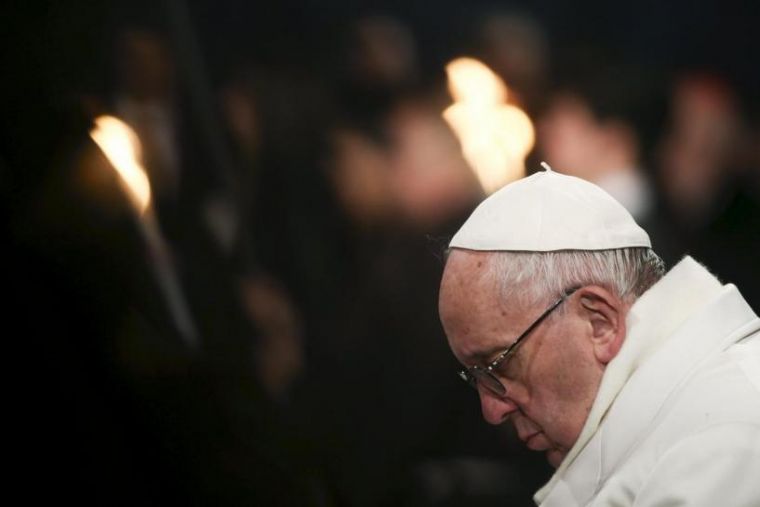Why Pope Francis needs all the prayers he can get as he visits Colombia, rife with poverty, corruption and war

Shortly after 11am this morning, Pope Francis took off from Rome on his five-day, Apostolic visit to Colombia. As hasbecome tradition before foreign trips, on Tuesday afternoon he visited the Basilica of Santa Maria Maggiore to pray before the icon of the Virgin Mary.
In a tweet before his departure, the Pope said, 'Dear Friends, please pray for me and all of Colombia, where I will be travelling for a journey dedicated to reconciliation and peace.'
He may need all the prayers he can get.
Colombia has been torn by armed conflict since 1964, and it is weighed down by drug-trafficking related to cocaine production.
Speaking to reporters on his plane as it headed toward Bogota today, Francis said the trip was 'a bit special because it is being made to help Colombia to go forward on its path to peace'.
As Fr Thomas Rosica, who translates material from the Vatican for the English-speaking media, said today, the Pope's trip shines a light on a nation in which the Catholic Church has not only taken an active role in peace negotiations between the government and guerrilla groups, but also has made it its mission to accompany the countless innocents caught in the crossfire, affirming their dignity and fighting for their rights.
On the eve his visit, Francis addressed the nation of 48 million people in a video message. He emphasised the need for peace and reconciliation in this politically polarised, Catholic-dominated country, where the majority live in poverty.
The motto for the visit is 'Demos el primer paso' ('Let us take the first step') and in his message, the Pope said it reminds us that 'a first step is always required for any activity or project' and 'also urges us to be the first to love, in order to build bridges, and create solidarity. Taking the first step encourages us to reach out to our neighbour, to extend a helping-hand and to offer a sign of peace.'
He added: 'Peace is what Colombia has sought after for a long time, and she is working to achieve it: A stable and lasting peace, so that we see and treat each other as brothers and not as enemies. Peace reminds us that we are all children of the same Father, who loves and consoles us.'
As a lengthy and learned feature in America Magazine pointed out, Colombia has suffered from an internal conflict that began decades ago when two guerrilla movements—the FARC (Fuerzas Armadas Revolucionarios de Colombia) and the Marxist-led ELN (Ejército de Liberación Nacional)—began fighting the government for land rights and to protect rural communities.
FARC, which is the larger of these movements, last year signed historic peace accords, brokered by Cuba, with the government after 52 years of conflict that left 260,200 dead, 60,000 unaccounted for and over 7 million displaced.
However, a second, equally brutal armed conflict is still being conducted by the ELN, with 1,500 fighters.
Earlier this week, just 48 hours before the Pope's arrival, the group and the government declared that they had agreed to a ceasefire that could open the way to a final peace settlement.
It was an early sign, perhaps, of the power of the Pope's visit.
Pope Francis will visit four cities in Colombia over the coming days—Bogotá, Villavicencio, Medellín and Cartagena—in an attempt to promote reconciliation and to encourage efforts to tackle the social inequality, drug trafficking and corruption in the country.
Francis is familiar with the country, having visited as a Jesuit priest, twice as a bishop and six years ago as a cardinal.
'I am honored to visit this land so rich in history, culture, and faith,' he said in the video message. '[It is a land] of men and women who have laboured with tenacity and perseverance to make it a place where harmony and solidarity reign, where the Gospel is known and loved, and where saying "brother and sister" seems not out of place but a true treasure to protect and defend.'
He underlined that 'today's world needs specialists in peace and dialogue,' adding that 'the church also is called to the task of promoting reconciliation, both with the Lord and between brothers, as well as reconciliation with the environment, which is God's Creation and which we are savagely exploiting'.
Francis is the third pope to visit Colombia, which is – as the America Magazine article outlined - one of the most ethnically and linguistically diverse countries in the world.
Pope Paul VI came in 1968 but only visited Bogotá, and St. John Paul II went to 10 cities in 1986 including Bogotá, Medellín and Cartagena.
Francis is the only pope to go to Villavicencio, the centre of the civil conflict.
During his stay in the country, he will deliver five speeches, four homilies and two greetings and will recite the Angelus.
The Vatican spokesman Greg Burke said that Francis does not plan to meet the political opposition or any paramilitary groups so that he can remain neutral ahead of next year's elections.
This will be his fifth visit to Latin America since becoming pope, and the seventh country in the region that he will have journeyed to after Brazil in 2013, Bolivia, Ecuador and Paraguay in 2014 and Cuba and Mexico in 2016.











